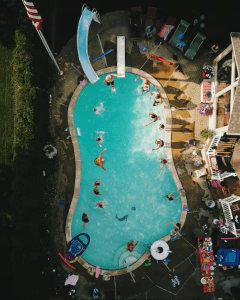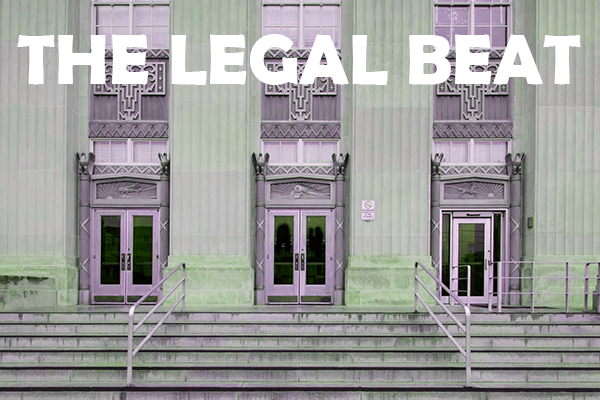|
RCBJ-Audible (Listen For Free)
|
Legal Case Has Dragged On For Two Years; Rockland County Is Seeking Records, Swimply Says County Is On A Fishing Expedition and Lacks Jurisdiction
LEGAL BEAT
Ahhh, the sounds of summer. Loud thumping music late into the evening. Teens and partygoers screaming. Car-filled cul-de-sacs overflowing. Is it a wedding, graduation? A summer solstice celebration?
 Nope. It’s your neighbor who has rented out his pool and backyard through Swimply or other online platforms that marry homeowners with backyard swimming pools and people who rent them from $50 to $120 an hour. Swimply lists about a dozen swimming pools for rent in Rockland’s towns and villages. Swimply also lists hot tubs, pickleball courts, and tennis courts for rent by the hour.
Nope. It’s your neighbor who has rented out his pool and backyard through Swimply or other online platforms that marry homeowners with backyard swimming pools and people who rent them from $50 to $120 an hour. Swimply lists about a dozen swimming pools for rent in Rockland’s towns and villages. Swimply also lists hot tubs, pickleball courts, and tennis courts for rent by the hour.
Apart from the nuisance, and potential violation of town ordinances, the renting of backyard pools as a commercial venture also may be a violation of public health codes, according to Rockland County. In July 2022, Rockland County began to investigate pool renting practices and whether these practices violated sanitary health codes.
To aid their investigation, the county and its health department in Aug. 2022 issued a subpoena to Swimply, Inc., a Delaware corporation whose principals live in Brooklyn and Long Island. The county was seeking four years of data on Rockland County property owners, renters, or occupants who’d rented or sought to rent their pools and backyards on Swimply’s online platform. The county sought names, addresses, pool locations, and records of rental transactions from June of 2018 to the present.
The court petition says: “The Deputy Commissioner is required under the provisions of Section 309 of the NYS Public Health Law to enforce, within the Rockland County Health District, the provisions of the NYS Public Health Law, the NY Sanitary Code and the RC Sanitary Code.”
New York State’s Department of Health says: “If you are not renting out your entire home, don’t rent your backyard pool unless you’ve obtained a public pool permit from your local health department.” Section 6-1.5 (Permits) of the New York health code mandates that “no person…shall operate or maintain or permit the use of any swimming pool or other related facilities without a permit from the permit-issuing official.”
In addition, an applicant needs to apply to the County for a permit 30 days before use.
Presumably, homeowners using Swimply have not been seeking permits or the county would have them on their radar. Swimming pools need to be competently maintained for health safety, given their requirements for chemicals, PH balancing and cleaning.
When served the subpoena in Aug. 2022 by Rockland County, Swimply refused to comply, saying the county exceeded its statutory authority in seeking Swimply’s records, and that the subpoena was a “flagrant attempt to disrupt Swimply’s business and harass its users.” It said in court papers, “Swimply has become a target of a fishing expedition by the County to obtain every document ever created about any homeowners in Rockland County that have ever rented their pool on the Swimply platform or who have even just thought about renting their pool on the platform… so that it can then issue (illegal and unenforceable) violations to individual homeowners for thousands of dollars, effectively shuttering Swimply’s business.”
In Oct. 2023, more than a year after the subpoena was served, Supreme Court Justice Christie D’Alessio dismissed the case and refused to enforce the subpoena, saying the County had not complied with a Court rule requiring parties to make a good faith effort to resolve the matter outside of court before seeking relief from the court. The case was dismissed without prejudice, meaning that the County could refile it. In Feb. 2024, the county issued a new subpoena for the same documents, and sought to resolve the issue without court intervention.
“We believe there is no valid reason for them to withhold the requested materials, and we fully expect this process to succeed in securing the necessary records,” said a county spokesperson.
But Swimply continued to maintain that the county lacks the authority to investigate, and that it cannot justify its need for an investigation. It says Swimply neither owns nor operates any facilities in Rockland County and therefore cannot violate any Rockland County Board of Health orders or regulations. “Swimply did not, and cannot, violate any laws relating to the operation and maintenance of pools, let alone within Rockland County. It merely operates a website that provides private pool owners with booking and payment mechanisms to rent out their pools to other private citizens.”
Swimply, co-founded in New York in 2018 by Chief Operating Officer Asher Weinberger, has been dubbed the Airbnb of swimming pools, but has not run into the same level of controversy as Airbnb. Swimply is backed by Mayfield Fund, Norwest Ventures, GGV Capital, Trust Ventures, Ensemble VC and other notable funds and angel investors.
Towns like Clarkstown and Orangetown have in recent years enacted short-term rental bans in an effort to crack down on Airbnb and other platforms. Of the dozen or so listings on Swimply, Clarkstown officials last summer said they are aware of a homeowner in Valley Cottage who rents his pool and backyard based on neighbors’ complaints. The listing, which is still on Swimply, advertises a “party pool” with resort vibes after sunset! The ad says the 90-degree pool is suitable for 35 people, and “our house is generally booked until late night because it’s technically a ‘party pool’.” The ad also says, “We have disco lights in both gazebos with a party speaker that lights up.” As an aside, it says hookah/smoking is allowed and implores guests “just don’t leave traces of what happens.”
Orangetown amended its code in 2023 to ban the short-term rent of any outdoor spaces, including, but not limited to, swimming pools, spas, playgrounds and yards in its residential zones. Towns can also crack down on these short-term rentals based on the zoning codes (converting residential properties to commercial enterprises), but not based on health codes. That’s relegated to the county. Most likely, Rockland County will face an uphill and protracted climb to fight Swimply but given that the issue is one regarding health standards, the legal battle will be an important one for backyard renters and their neighbors here and beyond.













